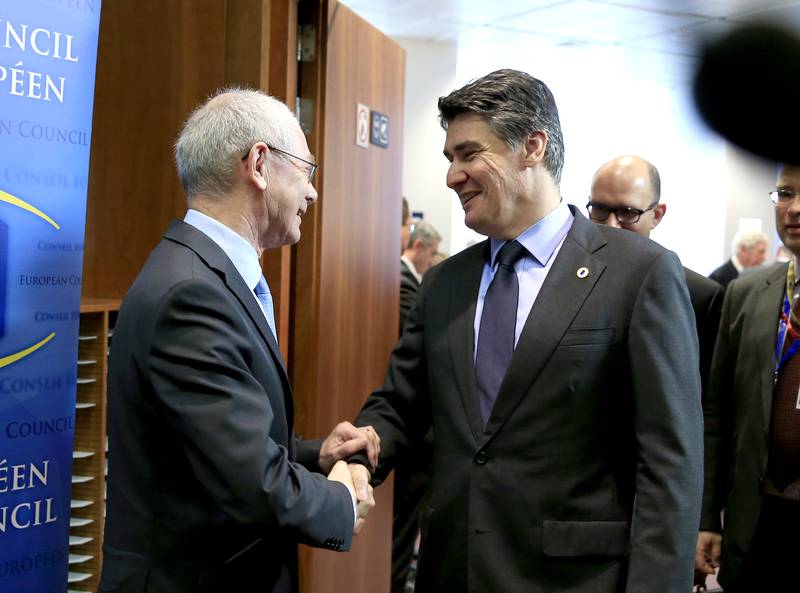Its' Geopolitics, Stupid!
Adelina Marini, March 10, 2014
Croatian media follow the developments in Ukraine with special interest because they remind them of the Balkan wars in the beginning of the 1990s. That is why, the comments in Croatian dailies and weeklies are particularly interesting. "It's the geopolitics, stupid!", wrote Drazen Curic, a columnist of Vecernji list, in a comment titled "Because of Ukraine Putin will Sacrifice Serbia". The author's thesis is that US and the EU's most important member states have been measuring ever since the end of World War II their power with the Soviet Union, whose legal and military heir is Russia. Ukraine is not the only neuralgic European spot where Obama and Putin have been matching their powers and are fighting for political, economic and military influence.

"We have quickly forgotten that the territory of former Yugoslavia was the first big clash between US and Russia which ended with the signing of the Dayton peace agreement. The Federation of Bosnia and Herzegovina has since been an area of interest for the West, while Republika Srpska (both part of the state of BiH) and its President Milorad Dodik are Russia's most loyal allies". Just like Ukraine is divided in pro-European and pro-Russian parts, Drazen Curic writes. They [Republika Srpska] sold their strategic enterprises to the Russians, most of all those that deal with oil and they are working with Putin on other major projects, which are not to the likings of the EU and US. However, the columnist believes, it is Republika Srpska and Dodik that can lose the most from the Ukrainian crisis.
Unlike Ukraine, which is close to Russia and is a genuine line of defence of Putin's geopolitical interests, Republika Srpska is far away and through it Putin can only tease the West. If somewhere a concession needs to be granted, this will happen in the Balkans which he [Putin] has already lost, especially given that even Serbia has started to get closer to the European Union. If Russia has failed to prevent the Americans to reach to Kiev, how can it prevent them to "acquire" Belgrade, the author asks.
"It is already clear why Croatia has been so aggressively reluctant to cooperate in the construction of the South Stream pipeline and why it has resisted so much to sell to Russia the Hungarian share of its oil company Ina. This is not only an economic issue", Drazen Curic continues and recalls that the reports in some Belgrade media are not unjustified that the sale of Ina to the Russians will be decided by the Americans. It is important to note here that, recently, the Croatian Vecernji list, quoting its own sources, revealed [in Croatian language] that the US will get involved in the solution of the Ina case. This is one of the biggest oil companies in the region part of which is owned by the Hungarian MOL. The conflict between Hungary and Croatia has been going on for two years now over the management of the company, which is why there are growing expectations Budapest to sell its share. Croatia, however, has been in severe recession for six years and recently entered an excessive deficit procedure, so the buying out of the Hungarian share in Ina is completely out of question. Russia has already signalled a desire to buy it, but Zagreb is reluctant.
Drazen Curic believes that soon "very interesting" political processes can be expected in the region of the Western Balkans which, "as things stand, could entirely remain under Western influence". It is possible to expect a change of the Dayton agreement which will mean weakening of the Republika Srpska. This will be a huge success for the US and EU which "have for quarter of a century tried to show who is the boss in the Balkans. In this light should be viewed the expected launch of a Balkan CNN which will be the US politics' support for the region", Drazen Curic concludes his comment.
Regarding his expectations that soon interesting things will unfold in the Balkans, probably in this category fits the Thursday news that Serbia demanded an urgent meeting of the UN Security Council on Kosovo. This happened precisely on the day when Russia offered the autonomous authorities in Crimea (Ukraine) to join the Russia Federation. Serbia's minister for Kosovo Alexander Vulin explained Belgrade's demand saying that the European civil mission in Kosovo, EULEX, has prevented the Serb radical Vojislav Kostunica and another Serb citizen to enter Kosovo. Mr Vulin added that the Kosovo security forces were transforming into an army which is in violation of resolution 1244 of the UNSS. A coincidence or not but, after Drazen Curic's logic, this news very well fits the category "It's the geopolitics, stupid".
 Kolinda Grabar-Kitarovic | © KGK
Kolinda Grabar-Kitarovic | © KGK Jozo Rados | © European Parliament
Jozo Rados | © European Parliament Aleksandar Vucic, Andrej Plenkovic | © Vlada RH
Aleksandar Vucic, Andrej Plenkovic | © Vlada RH